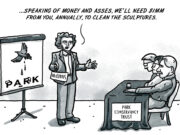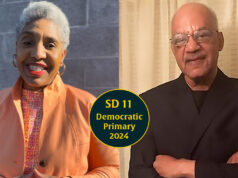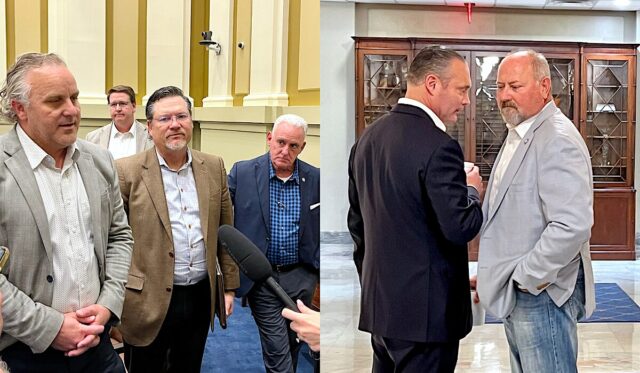

As the sixth public “budget summit” of the Oklahoma Legislature rolled into its fifth hour Friday, a Senate staffer handed out a paper containing the upper chamber’s counter offer to a House counter offer that had been made right after lunch.
As Senate President Pro Tempore Greg Treat pressed House Speaker Charles McCall on the top item — a request for commitment to have override votes on any budget item vetoed by Gov. Kevin Stitt — House Appropriations and Budget Committee Chairman Kevin Wallace looked at the second line on the page.
“On line number two, deposit of $76 million [into the Legacy Capital Financing Fund], is that a typo?” Wallace asked. “Is there a one that is supposed to be in front of that seven? You might want to explain this so we have the concept of your intent.”
Treat declined.
“I will be happy to go over it if you all will agree to put up and vote (on veto) overrides on any agreement that we come to today,” Treat said. “Otherwise, we will see you on Monday.”
With that, legislative leaders packed up their briefcases and wandered into the weekend without an agreement on the Fiscal Year 2025 state budget and without enough time to override any vetoes on appropriation bills they end up passing in regular session before the constitutionally mandated adjournment date of May 31.
In competing press availabilities over the next hour, each chamber’s leader blamed the other for Friday’s fallout.
“Is the speaker in charge of the House, or is the governor in charge of the House? We just got a clear — well — non-answer there,” said Treat (R-OKC). “I want the record to be clear that any concessions that we made today are not valid if the House is not willing to override vetoes that the governor may have. It’s been told to me repeatedly that the speaker’s team has told lobbyists and government agencies that they will not override vetoes, and I think I got — it wasn’t a clear response — but an understanding today that that may very well be what the speaker has directed his team to do.”
McCall, however, reiterated that he has made no such pledge to Stitt, and he said the two chambers should have continued negotiating in pursuit of a deal by the weekend.
“What we experienced today was an ultimatum by the Senate. They did not come to our positions that we asked them to, and they came up and blew up negotiations with an ultimatum on a veto override,” said McCall (R-Atoka). “To be honest and to speak with clarity about this process, the Senate is concerned with their relationship with the governor. They’ve been in an open fight with the governor, and they are concerned that the governor is somehow going to line-item veto the things they want in the budget.”
Treat nearly agreed, although he framed the issue preventing the opportunity for veto overrides — which will not be possible in regular session unless budget bills are advanced May 21 and sent to Stitt by May 24 — as a reflection of the House’s relationship with Stitt.
“It’s obvious they don’t want to override. I don’t know if they’re scared of the governor or they’re in partnership with the governor,” Treat said. “But there’s no reason for us to rush into these agreements that we just saw unless we had an opportunity to override (vetoes). They’ve taken that really off the table now, and we will negotiate in good faith.”
McCall rebuffed Treat on what Friday’s budget summit kerfuffle functionally means.
“If that’s what they’re concerned about, they should have gotten a deal with us today,” McCall said. “They just did exactly what they said they didn’t want to do today. They did not want to turn over control of the budget to the governor, but by not getting an agreement today, that’s what happened.”
Wallace (R-Wellston) agreed.
“Pro Tem Treat has been very adamant that he’s not going to turn over control of the Senate to the governor,” Wallace said. “But with his actions today, he has turned over the control of the Legislature to the governor.”
McCall interjected.
“Both the House and the Senate, because neither one of us will have an opportunity to override a veto of the governor,” he said.
For second year in a row, concurrent special session ‘an option’
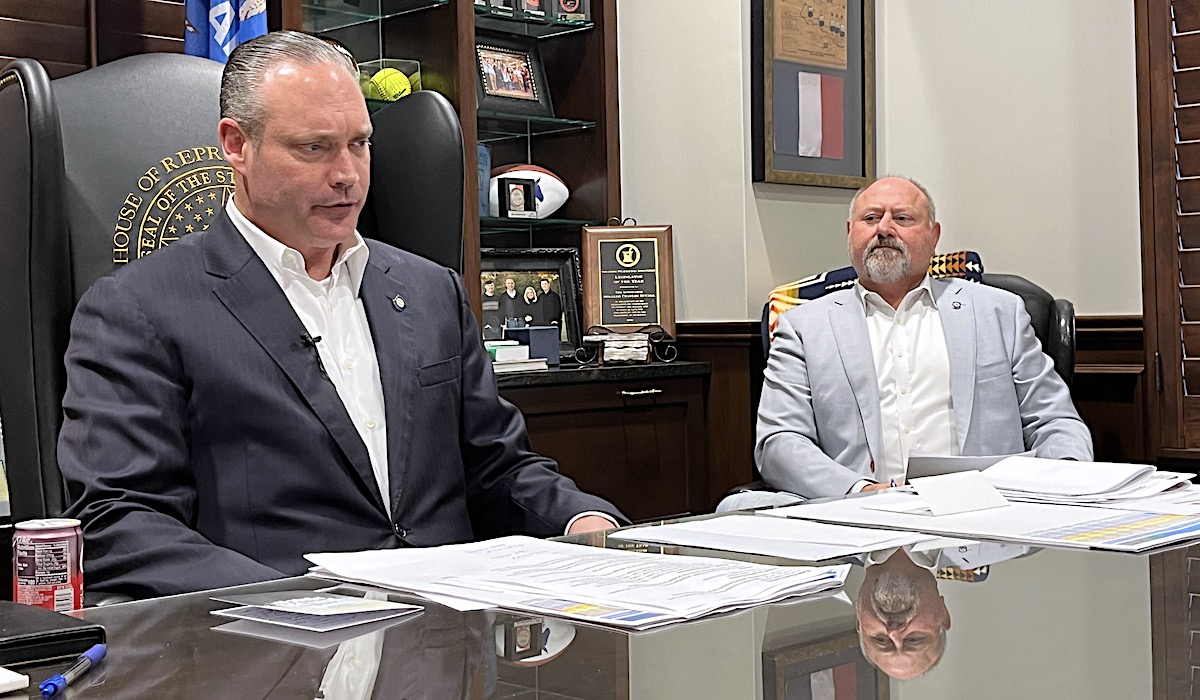
Of course, the Oklahoma Legislature is never short on procedural tricks to pull their proverbial chestnuts out of the fire.
Last year, as a massive education deal delayed and inflamed broader budget negotiations, both chambers called themselves into a concurrent special session and ran Fiscal Year 2024 appropriations bills in that manner to guarantee veto override opportunities, which lingered into July.
Asked if they could chart a similar course this year, both Treat and McCall said it was an option.
“It’s been tested in court. It stood up,” Treat said. “So I mean, if the House decides they want to represent the legislative branch again, we can have that conversation.”
McCall called another concurrent special session “an option,” albeit an avoidable one.
“There should not be a problem with getting a budget,” McCall said. “These maneuvers are just unproductive.”
Exactly how productive the last 48 hours of public budget negotiations have been remains unclear.
On Thursday, with McCall and Stitt not in the room, Wallace, Treat and a handful of other chamber leaders hammered out a few agreements, including a $25 million increase to the common education funding formula and a one-time $27.6 million appropriation to Career Tech centers. On Friday, they agreed to a complicated $18 million plan aimed at increasing pay for county sheriff office employees.
But in his post-spat presser, Treat called Friday’s agreements “not valid,” and House members remain irked by his decision nearly three weeks ago to unwind agreements he said were made “in the dark” and that House leaders said were made in a Senate conference room with their subcommittee chairmen present.
“I’ve come to realize many times over the years, a final deal with the Senate isn’t a deal until it’s in writing and they pass the bills,” Wallace said. “I’ve seen them pull back from positions many times. So if you’re asking me, ‘Would it surprise me if they changed from an agreement that they made yesterday?’ No.”
In his mind, Wallace said the $25 million education appropriation increase and other items agreed to earlier this week should remain in effect.
“The deals we made yesterday, I honor them. I always have,” Wallace said. “If they pull back, then yes we will pull back.”
McCall concluded his press conference with an observation about the income tax cut proposal he and Stitt have pushed for months and that the Senate has declined to consider after already eliminating the state portion of sales tax on groceries earlier this year.
“I find it ironic that the Senate is asking me to guarantee we put up (…) a veto override when they refuse to put up a vote — just a vote — on a tax cut,” McCall said. “There’s a lot of irony in that demand.”
Contention centers around Legacy Capital Financing Fund
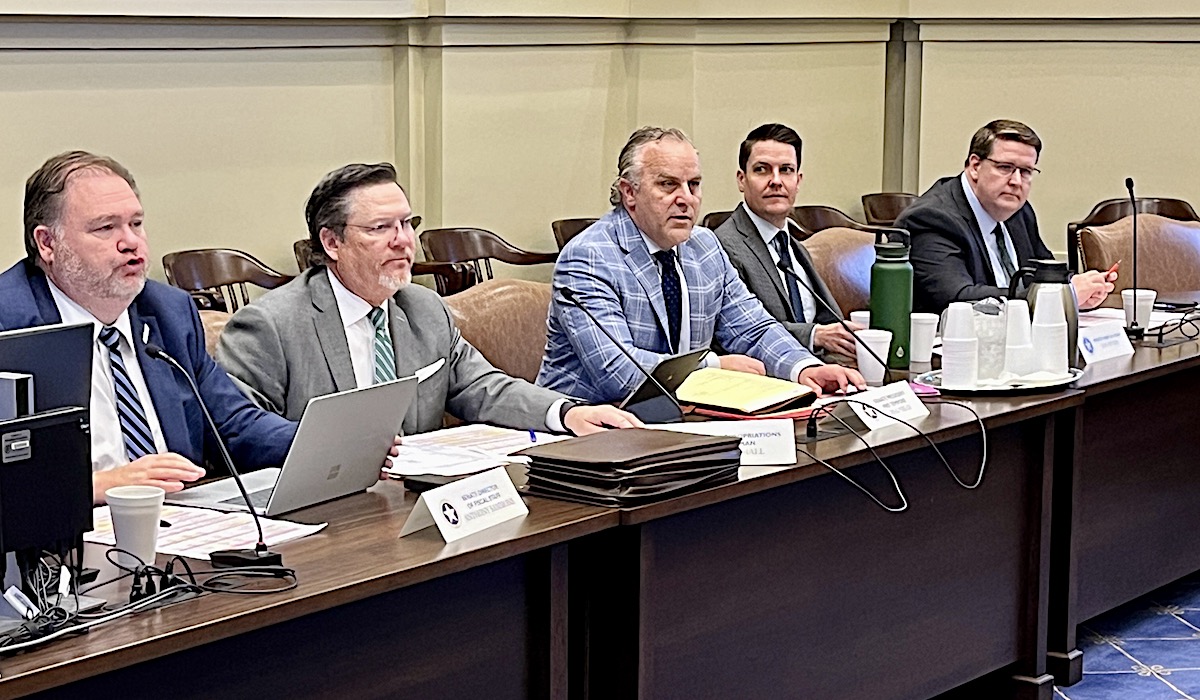
When legislative leaders do resume their budget negotiations Monday, the primary issues left unaddressed Friday involve:
- A Stitt request for $20 million in the Quick Action Closing Fund, which the House supports and the Senate opposes;
- Distribution percentages for deffered maintenance projects;
- What to fund in terms of capital improvement projects, and which ones to fund through the self-financing repayment program created last year called the Legacy Capital Financing Fund.
Those items dominated the documents handed out Friday, first by the Senate, then by the House and finally by the Senate when the veto override ultimatum upended the conversation.
On their second offer, the Senate reduced its proposed LCF deposit from $125 million to $76,001,472 but retained the House’s proposal to add $110 million of Oklahoma State University projects into the LCF mix.
Last year, lawmakers created LCF and put $600 million into it, immediately dedicating $300 million for a slate of agency building projects and stipulating that the agencies would repay the interest-free funding over 20 years.
With roughly $295 million estimated to be in LCF by the end of the fiscal year, McCall and Wallace started Friday’s negotiations by explaining their desire to dedicate $1 billion to the self-financing fund. At that level, they said, the fund would be “self-sustaining” long-term and in a manner that “takes the pressure off of future revenues.”
On Thursday and Friday, Senate Appropriations and Budget Committee Chairman Chuck Hall and Treat had attempted to designate a $20 million minimum project cost that would qualify something for LCF appropriation instead of direct-cash contribution.
After Friday’s budget summit ended, Hall underscored senators’ skepticism about LCF by explaining their drop in offer from $125 million to $76 million and change.
“What we’ve done is we’re funding all of those requests in our budget proposal, and then we’re adding enough to cover the full amount of the requests,” said Hall (R-Perry). “So it gets to zero, but that doesn’t make that account zero. We still have recapitalization payments that are coming in. And then with every recapitalization, we’ll have interest coming in, etc, etc. So what we’re doing is we’re using the LCF deposits that were authorized for us, and we’re using them in a proper fashion.”
But House members said the Senate had made mathematical errors in their proposal, which they said would have left LCF $31.8 million “over-subscribed.”
“On the counter-counter offer, we saw it and immediately knew it was upside down,” said House Speaker Pro Tempore Kyle Hilbert (R-Bristow). “That’s why Chairman Wallace asked if it was a typo, because it was clearly upside down.”
Wallace said he thinks senators are just trying to undercut the LCF self-financing mechanism in its second year and return the state to a practice of taking out massive loans with significant interest rates paid to financial firms for capital projects.
“For some reason, the Senate really can’t get onto the concept (of LCF), I think because it was a House idea,” Wallace said. “Greg Treat said numerous times this week that it has notable qualities, but, you know, they’re just not a big fan of LCF. I do believe that they want to term that out and suspend it. But if you think about the position of the Legislature for future legislatures, why wouldn’t you do your own self-financing and pay yourself back? To me, that makes very good business sense, but the Senate doesn’t want to do that.”
But Treat said that conversation needed to occur only after receiving assurance that the House would support the full budget agreement by pledging to override gubernatorial vetoes, something he claimed he and McCall have agreed privately to do each of the past five sessions.
“We always have an agreement with the House that we will override on budget things,” Treat said. “You haven’t been able to see it because it’s been behind closed doors. This is a change from the norm.”
McCall called Treat’s statement false.
“I’m not aware that there is any tradition between the two chambers that we are guaranteeing to take up overrides. The Senate can’t even deliver on what they agreed to the last two years. They’ve not even been able to pass all the bills to get to a potential override. So I think that’s just — maybe you just misunderstood what he said, because what you thought he said certainly wouldn’t be the case.”
Asked whether he has “ever” had an agreement with Treat to guarantee budget-veto overrides, McCall simply said, “No.”
Speaking to media in Tulsa earlier Friday, Stitt emphasized his desire for an income-tax rate cut and hinted he has frustration with how some budget summit shenanigans have unfolded.
“The Legislature writes the budget, and out of the same side of their mouth they say they don’t want the governor involved in what our constitutional duties are,” Stitt said. “They need to get one done today.”
That didn’t happen, however. Stitt declined to tip his hand to reveal whether the cap is on or off his well-worn veto pen.
“I’m not going to speak to whether I’m going to veto or not veto the budget at this point, but I’ve been pretty clear,” Stitt said.







